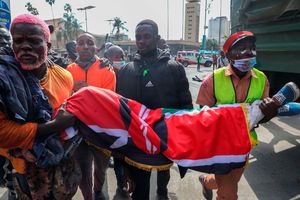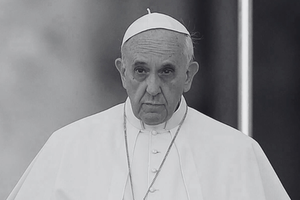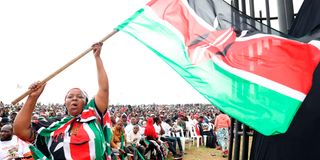
A woman lifting a Kenyan flag at Uhuru Gardens in Nairobi during Jamhuri Day celebrations on December 12, 2023.
I’m a mongoose. My job is to stand on my tail and scan the Savannah, to twitch my sensitive nose and smell the air, and describe to members of my Herpestidae family what I see and smell.
Four things have happened in the month of April whose aroma will linger down the years of our political, diplomatic and economic history.
President Trump, who by the way is always right, launched a full-on trade war against China on “liberation day”, April 2, 2025, consisting of tariffs against most of the world but with a special attention on China, in keeping with Mr Trump’s personal belief that the rest of the world, but particularly China, has been taking advantage of the US and it was time to put an end to it.
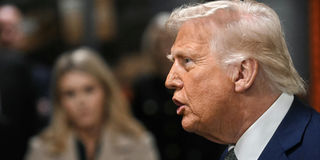
US President Donald Trump talks to members of the media as he visits the John F. Kennedy Center for the Performing Arts in Washington, DC, US, March 17, 2025.
What Mr Trump announced were not actually reciprocal tariffs as such, but some kind of retaliation against nations which sold to the US more than they bought and therefore had a trade surplus.
Mr Trump’s liberation has disrupted the so-called rule-based trading system and defence alliances which have helped the West maintain stability and dominance for more than 70 years.
China has developed a fantastic manufacturing capacity and some of the best supply chains in the world.
It is therefore able to sell to everyone and has developed the second largest economy by GDP, overtaking Germany, Japan and other traditional economic powerhouses.
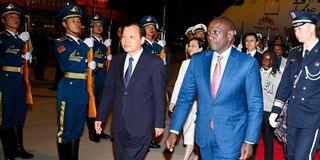
President William Ruto is received by the Chinese Minister of Transportation Liu Wei at the Beijing International Airport in People’s Republic of China.
China, in some views has set itself up in competition not just with the United States, but the West in general and well beyond economic matters.
It is also a military, cultural and ideological rival to the West and increasingly leads the Brics, a bloc that seeks to provide an alternative to the established global order.
This being the case, for Third World countries, there is a delicate dance of alliances and allegiances in order to survive and prosper in this increasingly polarised context in which siding with China is not taken very kindly, by the Trump White House.
On April 23, President Ruto left for a state visit to the People’s Republic of China, a considerable honour to most countries, whose timing, however, is fraught with diplomatic risk. China has gone toe-to-toe with the big gorilla, a messy fight is likely.
They are making Mr Trump look bad. First, the White House told them not to retaliate with counter tariffs and ask for a call between their President, Xi Jinping and Mr Trump. Not only did they retaliate, but they have also refused to request the call, denied initiating any negotiations with the US and have been saying that they will “not kneel”.
When an elephant wants to trample you, it improves its grip by picking you together with a whole load of the vegetation around you.
The vegetation around China is at a greater risk of retaliation than the Chinese, who, in any case, have a stronger bargaining position. They have “cards”, the vegetation has none.
The BBC last week aired its Blood Parliament investigation, which pointed a finger at a KDF soldier as having shot a fleeing protester in the head during the youth protests on June 25 last year.
The damage to the reputation of KDF as a professional force quite apart, the documentary lifted the government’s skirts in public for the first time in a long time.
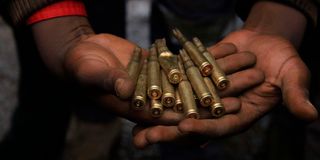
A protester displays spent cartridges used by police to disperse anti-government protesters in Karatina town, Nyeri County on July 16, 2024.
The government said 42 people were killed. Amnesty International says 65 were killed and 89 disappeared, presumably also dead.
IPOA, the police oversight body, says 60 deaths are so far under investigation. What the documentary does is to fix a spotlight on the brutality of the crackdown that is largely uninvestigated and continues to sit at a corner like a giant landmine.
I will concede that if you believe that the BBC World Service does not serve British foreign interests and was altruistically set up to provide us poor Third Worlders with clean, disinterested, objective news solely for our benefit, then you should be locked up and milked with the other cows.
In the middle of this riot, who walks right in? Dr Fred Matiang’i, on leave from the World Bank, blissfully whistling Babu Gee Omosayansi’s Single Room, looking forward to a couple of weeks of rough ugali, maziwa mala and bitter vegetables.
The guy has not said whether he wants to run for anything, but walks smack into two stampedes. Every government blogger who can put smoke on a mirror has been mobilised to pulp him with invented scandals and some favourite fictions.
To opposition politicians, the former Security minister is political gold dust, a means to breathe new life into tired CVs and bring a bit of excitement into their limp politics.
After the political fiasco of the last couple of years, I think both sides see in Matiang’i an eminently electable opportunity/threat.
They know that he is smart – old fashioned University of Nairobi PhD smart – of proven competence, good global exposure and single-mindedly firm; the resume of the kind of technocrat-president to dig the country out of the ditch.
When you put all these things together – a perilous global environment, a government grappling with serious mistakes, an angry country looking for an alternative – you realise that this is a moment to love and not give up on our country, love one another, always do our best.


